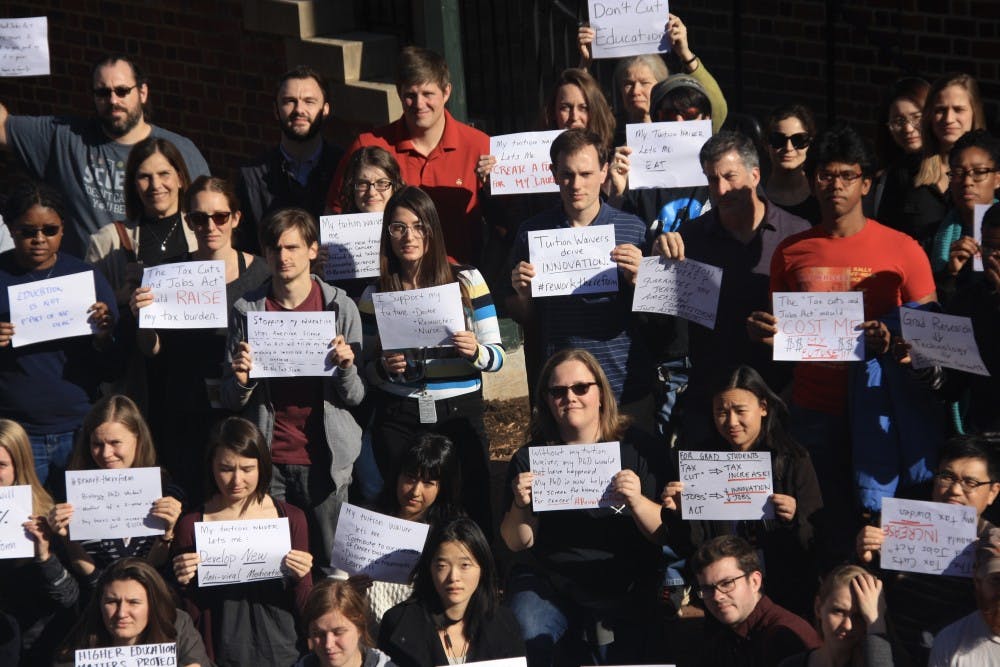A group of about 50 University graduate students, as well as members of the faculty and administration, met on Wednesday in Newcomb Hall in an effort to press elected officials to oppose a national tax reform bill that passed the U.S. House of Representatives Nov. 16. The effort comes as the Senate is slated to vote on its own tax plan in the next coming days.
At the heart of graduate students’ concerns is a provision in the House bill that would tax tuition waivers. Currently, graduate students can work for the University in exchange for a tuition break. This work usually involves working as a research or teaching assistant. The House proposal would consider this tuition break taxable income, and graduate students say would make it very difficult — or even impossible — for some to continue their education.
Attendees were urged to contact their elected representatives, especially U.S. Sens. Tim Kaine (D-Va.) and Mark Warner (D-Va.), as well as Rep. Tom Garrett (R-Va.), via phone to voice their concerns. Pictures of attendees holding pieces of paper signalling their opposition to the bill were also shared via Graduate School of Arts & Sciences Council’s Twitter page.
These messages included “The ‘Tax Cuts and Jobs Act’ COSTS ME $4,426” and “This act will threaten America’s leadership in STEM.”
Leeza Constantoulakis, a graduate student and president of the Graduate School of Arts and Sciences Council, assisted in the organization of the event. She said the Twitter campaign was put together in order to “put a face” to students that would be affected if the bill were to pass.
“I’ve had multiple graduate students come up and tell me ‘I think I’d have to drop out of school, I can’t afford to do this,’ which is really sad,” Constantoulakis said.
A typical doctoral student in the Graduate School of Arts and Sciences earns around $24,000 per year in wages and stipends, corresponding to a tax rate of $1,574. If the House bill is passed and tuition remissions are taxed, this rate would increase to $4,920 per year.
“Looking month-to-month, you’re talking 20 to 30 percent of what a student makes per month would go to the taxes,” Constantoulakis said. “So students who are already asked to live with so little would be asked to live with even less.”
David Keder, also a student in the Graduate School of Arts & Sciences, agreed that the tax proposal would place an additional burden on students.
“We’re trying to get the message out that this would negatively affect all of us. It essentially amounts to a tax hike on people who don’t make that much money,” Keder said.
“I work a lot of hours, I work on medical imaging and I have one patent pending since I’ve been here, and just secured more money to come to the University,” he added. “I think it’s kind of unfair that it may get impacted in this way.”
Attendees also argued that the tuition remissions awarded to graduate students are earned by contributing to the University, and that taxing these would have negative repercussions not just for students, but for the broader University community as well.
“There are a lot of nervous people,” said Aaron Laushway, associate dean of students. “The challenges will be recruiting talent among our graduate students, who are the future professors, instructors, teachers and researchers and university presidents going forward.”
House Republicans, meanwhile, have argued that tuition reimbursements benefit only a small number of Americans and that taxing them would allow for cuts that would have broader benefits.
“Do we want a complicated tax code that gives these small, sometimes invisible benefits to certain Americans — that, by the way, a lot of Americans don’t take advantage of because they don’t know they exist?” Rep. Carlos Curbelo (R-Fla.) said this month during a debate concerning education, according to the Washington Post.
“Or do we want a tax code that treats everyone more fairly, that provides growth opportunities for more people, that gives every American the opportunity to rise, to thrive, to flourish? That’s the debate we’re having here,” Curbelo said.
Constantoulakis said the bill would have wide-ranging negative implications if passed.
“It not only crushes higher education, it affects the University in terms of helping research, classrooms, teaching, and I think it would be a real step backwards for this country in terms of higher education,” Constantoulakis said. “It was great to see faculty and staff come out and support us as well, because this does affect not only the graduate students but the University as well.”
University President Teresa Sullivan has also expressed her concerns with the House bill. In a letter to Warner, she said there were provisions in the proposed legislation that “would negatively impact our students and the institution itself, ultimately making college less affordable, discouraging participation in higher education and decreasing U.S. competitiveness globally.”
The Senate will vote on its own tax bill — which does not include a tax on tuition waivers for graduate students — late Thursday or Friday. If it passes, House and Senate members will meet to determine which provisions from each bill, including the House’s tuition waiver tax, will make it into the final piece of legislation.







